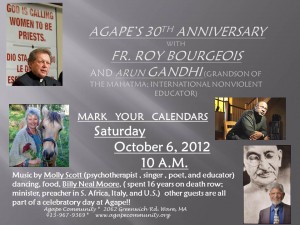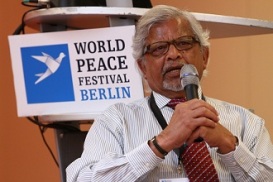Just got back from Sweden where I had a reunion with 32 of my 132 grandchildren! Sounds goofy? Maybe, but it is a fact. In another life, when Sunanda and I lived in Mumbai, India, and worked for the poor and oppressed while raising our family we learned that scores of little, new-born, babies were being abandoned by their unwed mothers because the mother’s could not face the stigma that is often ruthless.
My 132 Grandchildren
Some of these babies died of exposure and trauma – after all, they were just two-three days old. Those who were institutionalized did not fair better. The infant mortality rate in orphanages in India was very high. More than half the babies would die before the age of 5.

Over a period of 10 years during the 1970’s we were able to find loving homes for 128 babies (we have four biological grandchildren!) who were condemned as “unwanted”. I protested vehemently. “There are no babies who are unwanted. There is always someone in the world who wants a baby.” Many of the 128 babies were given to families in Sweden and in 1994 when most of them were in their teens we were invited for the first reunion. Over a weekend we stayed together as one big human family and I tried to address many of the concerns of the children. Their main request was that we should help them find their biological parent.
This, of course, was impossible. Almost all of them were abandoned in the streets without any documentation. Even their birth dates had to be medically determined. I told them all of these facts and then asked them why were they so eager to find the biological mother.

Their answer was poignant. Ever since they started school, they said, they would hear all their friends talk about whose eyes, whose nose or whose hair they had inherited. These Indian children did not look like any of their adopted parents. So, finding this important information became an obsession with them.
I apologized and said that Sunanda and I had to take the decision to give them to Swedish families since they were too small to decide for themselves. We did it with all good intentions after realizing the Swedish couples were indeed loving and sincerely wanted a baby.
“If you think we made a mistake and messed up your life,” I said. “Then please forgive us. We did what we did with good intentions because the alternative was too grim to even contemplate.”
There was a moment of silence in the room and then in a chorus all of them said: “We no longer have a problem. We can now tell the world that we look like our grandparents.” They pointed towards Sunanda and me sitting in the midst of the circle. There was not a dry eye in the room.
(Read more about this experience in subsequent blogs.)


 Ed note: The following is a transcript of an interview by ISKRA staff with Arun Gandhi that took place on March 19, 2013. Arun is the grandson of Mohandas (Mahatma)Gandhi and heads the Gandhi Institute for Nonviolence located in Rochester, NY. He has previously made appearances in Brilliant as well as Grand Forks and will be speaking at the Brilliant Cultural Centre on May 17, 2013. We feel fortunate to have the opportunity to interview Arun and ask him several questions provided by our ISKRA staff as well as members of the broader Doukhobor community. It was truly a pleasure to converse with this soft spoken advocate of peace and nonviolence. We were impressed with the simplicity and wisdom contained in the philosophical views that he shared with us. We encourage our readers to reflect on his comments.
Ed note: The following is a transcript of an interview by ISKRA staff with Arun Gandhi that took place on March 19, 2013. Arun is the grandson of Mohandas (Mahatma)Gandhi and heads the Gandhi Institute for Nonviolence located in Rochester, NY. He has previously made appearances in Brilliant as well as Grand Forks and will be speaking at the Brilliant Cultural Centre on May 17, 2013. We feel fortunate to have the opportunity to interview Arun and ask him several questions provided by our ISKRA staff as well as members of the broader Doukhobor community. It was truly a pleasure to converse with this soft spoken advocate of peace and nonviolence. We were impressed with the simplicity and wisdom contained in the philosophical views that he shared with us. We encourage our readers to reflect on his comments.

 It is our voracious appetite for oil and natural gas at a cheaper price that spurs the industry to exploit the earth’s natural resources, so, not surprisingly, the consumer is a guilty as the producer. None of us raised a voice when the same industry was exploiting and devastating the environment and resources of other countries to feed the monster in our backyard. Now that the world has become wise and curtailed the power of the Oil Industry to plunder the resources in their countries we do not want them to do the same in our backyard with natural gas. Clearly, the choice before us is: Do we stop the monster that is set on ruining the earth for future generations or do we mindlessly sacrifice the future generations.
It is our voracious appetite for oil and natural gas at a cheaper price that spurs the industry to exploit the earth’s natural resources, so, not surprisingly, the consumer is a guilty as the producer. None of us raised a voice when the same industry was exploiting and devastating the environment and resources of other countries to feed the monster in our backyard. Now that the world has become wise and curtailed the power of the Oil Industry to plunder the resources in their countries we do not want them to do the same in our backyard with natural gas. Clearly, the choice before us is: Do we stop the monster that is set on ruining the earth for future generations or do we mindlessly sacrifice the future generations. 



 Dr. Arun Gandhi will be in Chattanooga for a week in September to participate in activities designed to highlight the legacy of nonviolence left by his grandfather, Mahatma Gandhi.
Dr. Arun Gandhi will be in Chattanooga for a week in September to participate in activities designed to highlight the legacy of nonviolence left by his grandfather, Mahatma Gandhi. For Immediate Release, London, UK – Jul 26, 2012 –
For Immediate Release, London, UK – Jul 26, 2012 – 


 Sixty years after his death a portion of Gandhiji’s ashes, stashed away by Madalsa and Shriman Narayan, the daughter and son-in-law of Jamnalal Bajaj, will be immersed at Chowpati Beach in Mumbai. Although I will be thousands of miles away in the United States the memories of sixty years ago will be refreshed and the day will be as poignant as January 30, 1948. In 1969 when the world celebrated Gandhiji’s 100th birth anniversary many of us who had lived in Sewagram Ashram, Wardha, with Gandhiji were invited for a reunion.
Sixty years after his death a portion of Gandhiji’s ashes, stashed away by Madalsa and Shriman Narayan, the daughter and son-in-law of Jamnalal Bajaj, will be immersed at Chowpati Beach in Mumbai. Although I will be thousands of miles away in the United States the memories of sixty years ago will be refreshed and the day will be as poignant as January 30, 1948. In 1969 when the world celebrated Gandhiji’s 100th birth anniversary many of us who had lived in Sewagram Ashram, Wardha, with Gandhiji were invited for a reunion. Arun Gandhi, grandson of the late Indian spiritual and political leader Mahatma Gandhi, is among the most respected and influential figures in the international peace movement. He was born in South Africa where he was subject to the daily injustices of apartheid and yet raised in a family that taught him that justice does not mean revenge but rather transforming the other through love. Arun is the founder of M.K. Gandhi Institute for Nonviolence and the author of five books including World Without Violence and Testament to Truth.
Arun Gandhi, grandson of the late Indian spiritual and political leader Mahatma Gandhi, is among the most respected and influential figures in the international peace movement. He was born in South Africa where he was subject to the daily injustices of apartheid and yet raised in a family that taught him that justice does not mean revenge but rather transforming the other through love. Arun is the founder of M.K. Gandhi Institute for Nonviolence and the author of five books including World Without Violence and Testament to Truth.
 While in Port-Au-Prince, Arun Gandhi also visited with Haiti’s First Lady, Premiere Dame Sophia Martelly to discuss the current situation in Haiti and begin a dialogue on how Mahatma Gandhi’s philosophy of nonviolence can be implemented in the ongoing development work following the 2010 earthquake.
While in Port-Au-Prince, Arun Gandhi also visited with Haiti’s First Lady, Premiere Dame Sophia Martelly to discuss the current situation in Haiti and begin a dialogue on how Mahatma Gandhi’s philosophy of nonviolence can be implemented in the ongoing development work following the 2010 earthquake.



 DENVER – The world has been watching Egyptians try to force change in their government. That includes the family of Mahatma Gandhi. He led a peaceful independence movement in India in the 1930s and 40s. Thursday night, his grandson arrived in Colorado.
DENVER – The world has been watching Egyptians try to force change in their government. That includes the family of Mahatma Gandhi. He led a peaceful independence movement in India in the 1930s and 40s. Thursday night, his grandson arrived in Colorado.